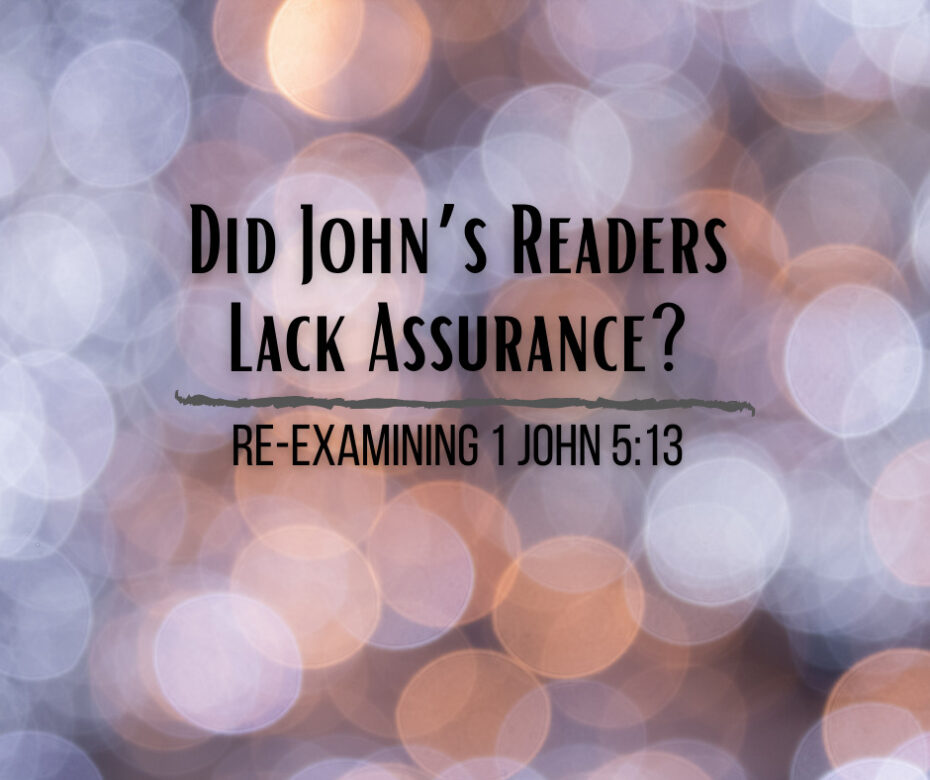Someone recently challenged the idea that assurance is of the essence of saving faith by quoting 1 John 5:13. That question has been answered before (see here and here). But I’d like to put an answer in my own words. The verse in question reads:
These things I have written to you who believe in the name of the Son of God, that you may know that you have eternal life, and that you may continue to believe in the name of the Son of God (1 John 5:13).
How can this verse be a proof-text against the idea that assurance is of the essence of saving faith? Here is the argument.
John says he writes, “to you who believe.” So these are believers. They are not potential believers or doubters, but believers.
And yet, he writes to them “so that you may know that you have eternal life.” What does he mean?
The phrase that you may know is in the subjunctive, which expresses potentiality. Does that mean John’s readers believe but currently lack assurance? If so, that would mean that assurance is not of the essence of saving faith, but something extra. As J. C. Ryle wrote, “Faith is the root, and assurance the flower. Doubtless you can never have the flower without the root; but it is no less certain you may have the root, and not the flower” (Quoted in Allen, 1 John, p. 235).
Is that what John was implying?
My answer is no, and I’ll give you an illustration to explain why.
Every night, I kiss each of my kids on both cheeks and tell them I love them. Sometimes they squirm and complain, but if they do, I’ll make a point to say, “I don’t want you to be kids who don’t know if their Daddy loves them. I want you to know that I love you.” And with that, they usually give in. Now, when I say that to my kids, am I implying that they don’t currently know that I love them? Of course not. On the contrary, I know that they know. However, I am suggesting that sometime in the future, they could doubt that I love them, and I want to prevent those doubts from ever creeping up.
Similarly, when John says, “I have written to you who believe in the name of the Son of God, that you may know that you have eternal life,” he is not implying that his readers currently lack assurance. On the contrary, he called them believers, and in the previous verses described what they believe:
He who believes in the Son of God has the witness in himself; he who does not believe God has made Him a liar, because he has not believed the testimony that God has given of His Son. And this is the testimony: that God has given us eternal life, and this life is in His Son. He who has the Son has life; he who does not have the Son of God does not have life (1 John 5:10-12).
I do not understand why so many people think you can believe in Jesus and yet also be agnostic about the life He gives. That is not John’s view. For John, the testimony about Jesus is that “life is in His Son,” and his readers believe that testimony. That is, they believe that “God has given us eternal life” and “he who has the Son has life.” This isn’t the fuzzy belief of so many in Christendom who claim to believe in Jesus but aren’t sure whether or not they have eternal life. Unquestionably, John’s readers believed they have eternal life.
The issue is not his readers’ present assurance, but the possibility that they could lose their assurance in the future because of the influence of the antichrists (1 John 2:18). The readers already knew about the promise of eternal life (1 John 2:25), and it was precisely on that point that the antichrists were trying to deceive them: “These things I have written to you concerning those who try to deceive you” (1 John 2:26).
Did you know that it is possible for someone to stop believing in Jesus and therefore doubt his salvation? We all know people like that. And that is the pastoral issue that concerned John. He was not trying to show that belief and assurance are two different things, but was warning that assurance of eternal life can be lost through false teaching.
So coming back to the initial question: does 1 John 5:13 prove that assurance is not of the essence of saving faith?
Not at all.
But let me go further. Not only does this verse not disprove that assurance is of the essence of saving faith, I think the passage as a whole implies it. How so?
What are the two possibilities for John’s readers regarding faith?
If you listen to some people (even within the Free Grace movement), you would think the possibilities are between (1) being a believer with assurance of eternal life vs (2) being a believer without assurance. But that is not what John says.
Reread vv 10-12.
For John, you can either (1) believe God’s testimony that He gives “us” eternal life in His Son, or (2) you can call God a liar.
There is no middle ground.
How can John draw such a stark contrast?
Simple.
Because assurance is of the essence of saving faith.


